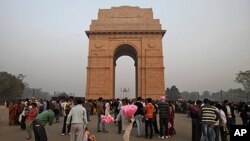The Indian capital, New Delhi, marked its 100th anniversary on Monday on a quiet note.The colonial past of a city whose foundation was laid by the British went unnoticed by Indian officials.
It was 100 years ago that Britain’s King George V announced at a grand ceremony that India’s capital would move from the eastern city, Kolkata, to a more strategic location in the north.
Adjacent to what was once the seat of the Mughal dynasty in India, British rulers built a brand new city called New Delhi. Its imposing colonial-style buildings included a palace for the British viceroy. The city had wide boulevards, huge parks and sprawling bungalows for the rulers.
After India won independence in 1947, the city stayed the capital.
On Monday, there were no official festivities to mark the birth of New Delhi - apparently because authorities’ were reluctant to recognize the colonial past of a city whose foundation was laid by the British, and commemorate a landmark associated with British rule.
But historian O.P. Jain, an advisor to the Indian National Trust for Art and Cultural Heritage, says the date deserves some recognition.
"It is a historical event, because of the fact that a new city was created and should be celebrated… You can't settle scores with history. You can learn from the history You can't fight with it," said Jain.
In an interview with a newspaper last month, Delhi Chief Minister Sheila Dikshit said, "There is ambivalence on what to celebrate and how to celebrate." A book release on the city’s history, Monday, and a photo exhibition later in the week are among low-key events being held to mark the occasion.
Authorities say they are planning year-long celebrations, starting in January, through a series of events to showcase the city’s cultural heritage.
New Delhi today is very different from the small city that it was under British rule. It has exploded into a huge metropolis of 18 million people. In addition to being the seat of political power of the world’s largest democracy, it has grown into a thriving business hub of a fast-growing country.
Still, historian Jain feels that, in many ways, the city along the banks of the Yamuna River, has not gotten the attention it needs.
"We have very badly neglected the river which was the boundary of Delhi," said Jain. "Of course cities do grow and Delhi also has grown, but not like a capital city should grow with planning and proper kind of monitoring and proper kind of vision… It requires better treatment and better understanding."
New Delhi was the last of several cities built in the era by kings and dynasties which ruled India before the British.
New Delhi Ignores Colonial Past on 100th Anniversary




